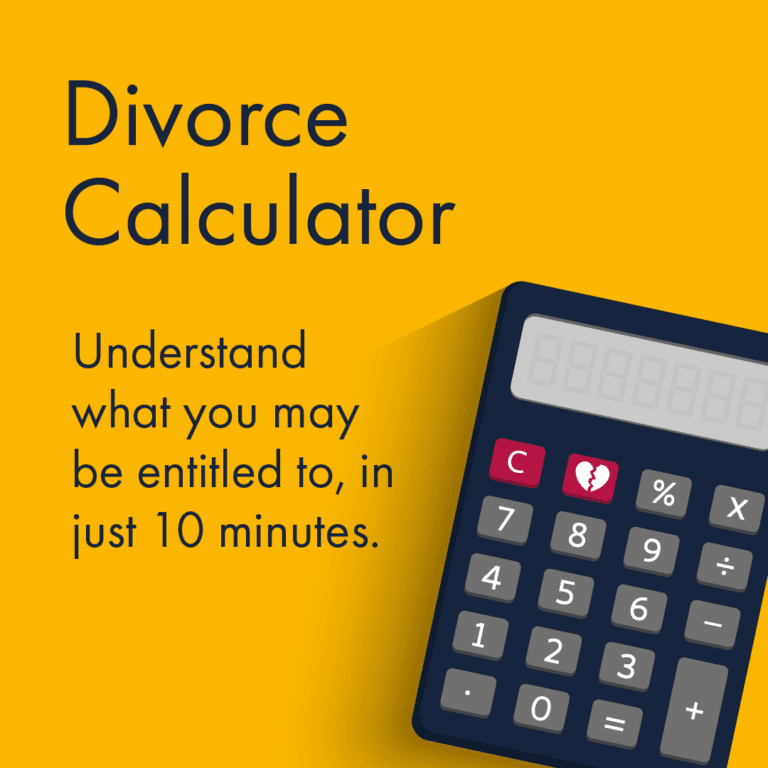 Use the calculator
Use the calculator
What happens when you divorce because of adultery?
While adultery may still be the reason for a marriage breaking down, since the introduction of no-fault divorce in April 2022, giving a specific reason or grounds for divorce is no longer legally necessary or possible. Now, whatever the cause of divorce the only justification needed is that your relationship has irretrievably broken down.
Since this pivotal law reform, the divorce process is the same whatever your reason for ending your marriage.
Common questions on adultery and divorce
Common questions on adultery and divorce
-
Does adultery affect a divorce settlement?
Contrary to popular belief, adultery has no impact on the financial settlement in a UK divorce. Instead, the family courts focus on ensuring that the financial needs of both parties and any children are met, rather than penalising one party for infidelity.
-
What are my rights if my husband or wife commits adultery?
If your husband or wife commits adultery, it does not entitle you to a larger share of the financial settlement. The court’s primary concern is the fair division of assets based on a number of factors such as the needs of each party and their financial contributions, not the reasons behind the marriage breakdown.
Your rights remain focused on ensuring fair treatment in terms of finances and child arrangements.
-
Is my wife or husband entitled to half if they cheated?
Yes, your wife or husband may still be entitled to an equal share of the marital assets, even if they committed adultery. The division of assets in a divorce aims to meet the needs of both parties and any children, regardless of infidelity or other reasons why the marriage is ending.
-
What happens if you cheat and get a divorce?
If you cheat and then divorce, your infidelity will not impact the divorce proceedings.
The no-fault divorce system means that your affair does not need to be disclosed to the court, and it will not affect financial settlements or child arrangements unless it directly impacts the welfare of the children, although if you have started living with a new partner this may be a relevant factor.
-
What am I entitled to if my partner cheated?
You are entitled to a fair division of marital assets based on your needs and contributions, irrespective of your reason for divorce. Adultery does not grant any additional rights or entitlements in the financial settlement.
-
What is legally classed as adultery?
Adultery is defined by law as voluntary sexual intercourse between a married person and someone of the opposite sex who is not their spouse. UK law does not recognise same-sex sexual encounters, sexual activity other than intercourse, or non-physical infidelities, such as emotional affairs or sexting, as adultery.
-
What is Micro Cheating?
Micro-cheating includes seemingly small or subtle actions that, while not as serious as an affair, still undermines trust in a relationship. These could be things like flirting with someone else in person or via social media, keeping certain communications secret, or maintaining connections with others in a way that your partner wouldn’t be okay with. It’s not full-on cheating, but it’s still enough to cause relationship problems and hurt.
A key concern with micro-cheating is that it often involves secrecy and a breach of agreed-upon boundaries, making it a form of emotional infidelity. It can be a slippery slope, where minor actions build up and potentially lead to bigger issues further down the road.
-
What do I do if a wife or husband commits adultery?
If your wife or husband has been unfaithful and you want to end your marriage you can file for divorce by simply stating that your relationship has irretrievably broken down.
Since the changes to divorce law in 2022, you are not able to cite adultery, or any other unreasonable behaviour on the part of your spouse, as the reason for divorce. So, you no longer need to seek your spouse’s admission, or provide any evidence.
Similarly, your wife or husband can apply for a divorce to end the marriage without your agreement simply by making a statement of irretrievable breakdown and you will not be able to stop the divorce from happening. However, there is a 20-week waiting period which allows both partners time to reflect on whether their marriage is over. -
Is it adultery to date while separated?
Perhaps. Having sex with someone of the opposite sex while still legally married, even if separated, is still considered adultery under UK law. However, this does not affect the divorce process under the UK’s no-fault divorce system or the financial settlement.
-
Is adultery a crime?
No, adultery is not a crime in the UK and has not been since the Matrimonial Causes Act of 1857.
-
Can I still try to prove adultery in court?
No. With the new divorce law reforms there is no legal process or need to prove adultery in a divorce.
Additionally, as adultery does not affect a divorce outcome there is no personal advantage of seeking to prove that your ex-partner has been unfaithful.
-
How does adultery affect child custody?
Adultery typically has no impact on childcare arrangements or a child’s right to see both parents.
-
Should you divorce on the grounds of adultery?
Under current UK law, you cannot cite adultery as a ground for divorce. The only ground for divorce is the irretrievable breakdown of the marriage, established through a formal statement during your divorce application.
 Download our free guide to divorce
Download our free guide to divorce
Supporting you when adultery leads to divorce
We understand that when your marriage breaks down because of adultery it can add an extra dimension to an already difficult experience. The emotional toll, while also having to make important decisions about financial and children issues, means you need a family lawyer who can provide steadfast support throughout the divorce process.
At Stowe Family Law, our solicitors are adept at handling the sensitive nature of separation after adultery. We are committed to guiding you through each step with the expertise and understanding necessary to achieve the best possible outcome.
We offer an award-winning service
Family Lawyer Liza Gatrell at Stowe Family Law shares her top tips on how to prepare for your first meeting with a divorce lawyer.
Newsletter Sign Up
Sign up for advice on divorce and relationships from our lawyers, divorce coaches and relationship experts.
Privacy Policy










